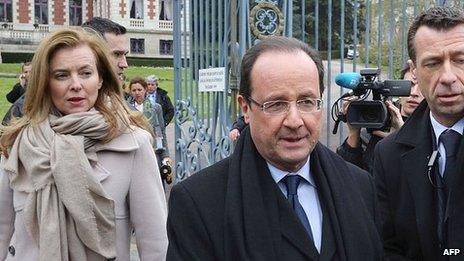The troubles of France's President Hollande
- Published
- comments

Opinion polls suggest Mr Hollande has lost much voter support since his election
France and its president are of major concern in Berlin and in Brussels. Some German officials say France is the country in the eurozone which worries them the most.
It is not about the recent scandal, which caught a French minister, Jerome Cahuzac, lying about his bank account in Switzerland. That certainly has embarrassed President Francois Hollande and has triggered the question of who knew what and may still lead to a government reshuffle or more.
It is not about another close ally of the president who had an account in the Caymans. Yes it sits uncomfortably with the rhetoric of the presidential election, during which Mr Hollande said "my true adversary is the world of finance". It revives the suspicion that the circle around Mr Hollande are "champagne socialists". Already the firebrand of the left, Jean-Luc Melenchon, is calling for a demonstration to "purify" the left.
It is the French economy that lies at the heart of the malaise. Sooner or later radical decisions will have to be taken. Mr Hollande campaigned on a growth ticket, but has watched the prospects of growth retreat.
He promised to challenge the German strategy for Europe of cutting deficits while restructuring economies. Mr Hollande does not believe the medicine is working. Indeed, recently he said "sticking with austerity would condemn Europe not just to recession but to an explosion". But it is the German narrative which prevails.
Deterioration
In the 11 months since President Hollande came to power, unemployment has risen in France to 3.2 million, the highest it has reached since 1997. Debt has gone above 90% of GDP. The promise to reduce the deficit this year to 3% of output has been discarded.
France is an important enough country to stand up to the European Commission, and there may well be further flexibility in reaching agreed targets for reducing the deficit.
But the core dilemma remains. France needs to find 60bn euros (ТЃ51bn; $78bn) of spending cuts by the end of 2017. The rich - many of whom have boarded the trains to London and Belgium - have been soaked. There is little alternative than to cut spending. Mr Hollande understands the challenge. Only recently he said that "public spending has reached 57% of national wealth. It was 52% five years ago. Do we live better for it? No."
Cutting the size of the French state would never be easy - particularly for a French Socialist. But cuts will have to be made at a time the economy is flat-lining. Consumer spending is in retreat. Car sales have collapsed.
President Hollande's appeal at the last election was that he was not Nicolas Sarkozy and that he would preserve the French way of life. It was a feel-good campaign - but reality has struck quickly. The challenge for the president is whether he will tell the French people that their social welfare model is not sustainable and that far-reaching reforms are necessary.
Some new rules have been adopted to loosen France's strict labour regulations. They are regarded as a start, but no more.
What so rattles the officials in Berlin and Brussels is the fear that France could slide into the category of those southern European countries in trouble. That has not happened yet, but the concern is of the markets losing faith in Paris.
On Monday President Hollande will have a working dinner with David Cameron. The British prime minister is looking for changes to the EU treaties as a means to winning some concessions for the UK. The French and the Germans (Mr Cameron will be in Berlin later in the week) may not oblige. They have cooled on treaty change, even if the eurozone crisis demands it.
In the case of President Hollande the last thing he would want is having to put a treaty change to the French people. In their current mood and faced with a stagnant economy they might well reject any referendum.